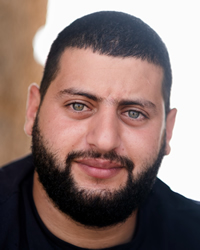Arab, Palestinian in Denmark

Photo Source:
Levi Meir Clancy - Wikimedia
Creative Commons
|
Send Joshua Project a map of this people group.
|
| People Name: | Arab, Palestinian |
| Country: | Denmark |
| 10/40 Window: | No |
| Population: | 21,000 |
| World Population: | 11,506,100 |
| Primary Language: | Arabic, Levantine |
| Primary Religion: | Islam |
| Christian Adherents: | 20.00 % |
| Evangelicals: | 0.10 % |
| Scripture: | New Testament |
| Ministry Resources: | Yes |
| Jesus Film: | Yes |
| Audio Recordings: | Yes |
| People Cluster: | Arab, Levant |
| Affinity Bloc: | Arab World |
| Progress Level: |
|
Introduction / History
When Roman emperor Hadrian conquered Israel in 135AD, he named the land Palestine. He chose this name because the Israelites had such a strong dislike for the Philistines (Palastina). Culturally many Palestinians claim they are Canaanites, the people who settled the land hundreds of years before. Biblically, Ham was a son of Noah and Canaan was a son of Ham. The word canani means "trader." Mizram, another son of Ham, was the name given for Egypt in Hebrew. The Bible states that Hagar, an Egyptian, became a bond servant to Sarah, the wife of Abraham. Unable to have children, Sarah gave Hagar to Abraham. Culturally this was acceptable at this time, however, it would not have been God's choice. Hagar gave birth to Ishmael. Genesis 16:12 says "His hand shall be against every man, and every man's hand against him." Ishmael had twelve sons who migrated into what are today the Arab nations. In Gen. 12:7-8 God said to Abraham that he would give him and his descendants the land (Israel) forever. In Deuteronomy 30:1-10, Gods promised to scatter Israel if they disobeyed him, but he would later restore them to their land. Because of their disobedience, the Israelites were taken into captivity to Assyria (approximately 734-732 BC.) and Babylon (587-585 BC). Israelis were scattered for many centuries.
This changed when Israel became an official nation in 1948. They expanded their land holdings following the Six-Day War in 1967. The occupation of the Palestinian Territories of the West Bank and Gaza meant that many Palestinians fled. Many lived in large refugee camps in neighboring Lebanon, Syria and Jordan. Some immigrated to the United States, Canada and the European countries, including Denmark.
In the second half of the 1980s some Danes felt there were too many Palestinians migrating to their country. Despite their protests many Palestinian were granted asylum throughout that decade. Others were denied asylum after 1990. In 1992, a special law on immigration granted asylum to some Palestinian refugees who were sentenced to deportation.
Currently Denmark supports the creation of a sovereign, democratic and peaceful Palestinian state. They give assistance to the Palestinians living in Israel and support organizations that are trying to help them improve their lives.
What Are Their Lives Like?
Many second generation Palestinians in Denmark have never been to the West Bank and Gaza, which they call Palestine. Commonly, the Palestinians in Denmark were born in refugee camps in Lebanon or Jordan. Most of what they know about Palestine is from their parents or grandparents regarding the ongoing conflict with the Israelis, the development of Palestine as a country, and personal property matters. This continues to fuel the anger they have against the Jewish people of Israel.
When asked what they regard as their true "home" younger Palestinians in Denmark often respond, "Where you can make a buck, stick it out." Denmark is their home. They along with their families are seeking employment or working at jobs especially in the areas of engineering, construction, medicine, sales, and trading. These people often make a lot of money.
Many Palestinian women have difficulty adapting to the European culture of Denmark. They face isolation and depression. Younger women have found it easier to adapt. Overall, problems of assimilating into the European culture is an ongoing problem for almost all Palestinians in Denmark. They also face suspicion from some Danes who think they have ties with terrorist groups.
What Are Their Beliefs?
Most Palestinians of Denmark are Muslim with the remaining number being Christian. They have built mosques and churches in their communities, and they have freedom to practice their religion. The ongoing conflict between the Palestinian Muslims and Palestinian Christians has carried over to their lives in Denmark. In some communities the two religious groups remain separate.
What Are Their Needs?
Palestinian refugees in Denmark must deal with cultural and linguistic differences, rejection, lack of employment, social isolation, and a lost hope of returning to the land of their origin. Muslim Palestinians seldom find comfort in their religion. They desperately need to turn to the grace, guidance and love found in God's word. Palestinian Christians need the support of other Christians in Denmark so they can have the spiritual strength and a faith that will allow them to reach out to Palestinian Muslims. Only by allowing themselves to be spiritual healed through the eternal salvation of Jesus will the Palestinians of Denmark find relief from their emotional pain and have the peace found in accepting Jesus.
Prayer Points
Pray that Palestinians in Denmark will be able to adapt to their new culture and find hope and peace through the grace, guidance and love found in God's word.
Pray for a work of the Holy Spirit to cleanse Palestinians in Denmark from bitterness which holds them back spiritually and economically.
Pray that the Palestinian Christians will be strengthened and find comfort through fellowship with other Christians in Denmark.
May Christ followers have the courage to reach out to Palestinian Muslims with the saving grace of Jesus.